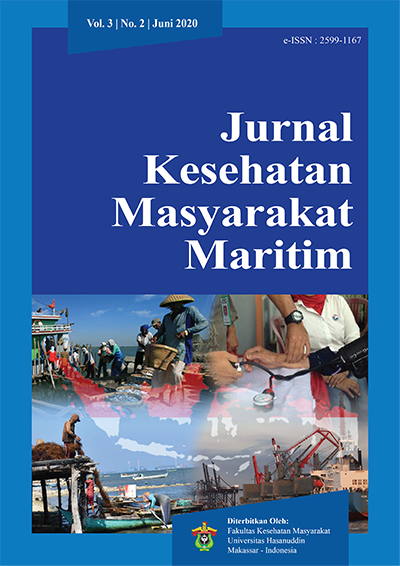Knowledge as Factor Increase Frequency of Vaginal Discharge in District Demak
DOI:
https://doi.org/10.30597/jkmm.v3i2.9389Abstract
ABSTRACT
Incidence of abnormal vaginal discharge is high in developing countries. Abnormal vaginal discharge is symptom of reproductive tract infections and sexual transmitted diseases. Knowledge vaginal discharge important for prepare and preventive abnormal vaginal discharge and improving practice hygiene sanitary. The study propose correlation knowledge of vaginal discharge with frequency of vaginal discharge. Study design was cross-sectional, sample were collected 60 participant. Data were collecting with interview by questioner. Data were analysis SPSS under 0.05 regarded as statistically significant with pearson correlation. Mean score of indicators definition 73,05±17,11, caused 81,11±12,82, prevention 63,83±16,06, impact 60,74±16,92, and total knowledge 60,74±16,92. Indicator of definition no significant correlation with vaginal discharge p = 0,072, indicators of caused significant correlation with vaginal discharge p = 0,002, indicators of preventive no significant correlation with vaginal discharge p = 0,067, indicators of impact significant correlation with vaginal discharge p = 0,032. Total knowledge significant correlation with vaginal discharge p = 0,005. Knowledge of vaginal discharge average high, indicators dominant is caused compare other indicators. Knowledge was significant correlation with vaginal discharge.
Keywords : vaginal discharge, knowledge, adolescent.
References
REFERENCE
Hassan, H. E. Infertility profile, psychological ramifications and reproductive tract infection among infertile women, in northern upper Egypt. J. Nurs. Educ. Pract. 6, (2015).
Hayat, I. M., Nagat, S. S., Nermine, N. E. M. & Zeinab, A. B. Prevalence of vaginal infection and associated risk health behaviors among married women in Ismailia city. Int. J. Curr. Microbiol. Appl. Sci. 4, 555–567 (2015).
Iwu, A. C. & Duru, C. B. Prevalence, pattern and predictors of abnormal vaginal discharge among women attending health care institutions in Imo State, Nigeria. J. Community Med. Prim. Heal. Care 30, 22–35 (2018).
Aduloju, O. P., Akintayo, A. A. & Aduloju, T. Prevalence of bacterial vaginosis in pregnancy in a tertiary health institution, South Western Nigeria. Pan Afr. Med. J. 33, 1–9 (2019).
Abdelnaem, S. A. Effect of self-care guidelines on knowledge and quality of life among faculty of nursing students with vaginal infection . Obstet. Gynecol. Int. J. 10, (2019).
Ilmiawati, H. & Kuntoro, K. Pengetahuan Personal Hygiene Remaja Putri pada Kasus Keputihan. J. Biometrika dan Kependud. 5, 43 (2017).
Haghighi, J. D., Jafarimodrek, M., Sohrabi, S., Azizi, H. & Hatam-Nahavandi, K. Trichomoniasis prevalence at a care center amongwomen with high-risk behaviors in Zahedan, Iran. Int. J. High Risk Behav. Addict. 8, 6–11 (2019).
Ezeanya, C. C. & Anukam, K. C. Health , Social and Economic burden of Bacterial vaginosis ( BV ) among Nigerian women of child bearing age : Can Probiotics restore the vaginal dysbiosis ? Journal of Medical Laboratory Science , 2019 ; 29 ( 2 ): 37-48 Health , Social and Economic burden. 29, 37–48 (2019).
Mudiyanselage, I. et al. VAGINAL DISCHARGE : WOMEN ’ S HEALTH SEEKING BEHAVIOURS AND CULTURAL PRACTICES RESEARCH ARTICLE VAGINAL DISCHARGE : WOMEN ’ S HEALTH SEEKING BEHAVIOURS AND CULTURAL PRACTICES * Ilankoon. (2015).
Nguyen, S. H. et al. Lack of knowledge about sexually transmitted diseases (STDs): Implications for STDs prevention and care among dermatology patients in an urban city in Vietnam. Int. J. Environ. Res. Public Health 16, (2019).
Tine, R. C. et al. Trichomonas vaginalis and Mycoplasma infections among women with vaginal discharge at Fann teaching hospital in Senegal. Trop. Parasitol. 9, 45–53 (2019).
Zaher, E. H., Khedr, N. F. H. & Elmashad, H. A. M. Awareness of Women Regarding Vaginal Discharge. IOSR J. Nurs. Heal. Sci. 06, 01–12 (2017).
Towle, A., Godolphin, W., Greenhalgh, T. & Gambrill, J. Framework for teaching and learning informed shared decision making Commentary: Competencies for informed shared decision making Commentary: Proposals based on too many assumptions. Bmj 319, 766–771 (1999).
Thompson-Leduc, P., Clayman, M. L., Turcotte, S. & Légaré, F. Shared decision-making behaviours in health professionals: A systematic review of studies based on the Theory of Planned Behaviour. Heal. Expect. 18, 754–774 (2015).
Godin, G., Bélanger-Gravel, A., Eccles, M. & Grimshaw, J. Healthcare professionals’ intentions and behaviours: A systematic review of studies based on social cognitive theories. Implement. Sci. 3, 1–12 (2008).
Youness Ahmed, E. & Omar, A. Effectiveness of planned educational program on vaginitis and its preventive measures on adolescent female nursing student’s knowledge. Egypt. Nurs. J. 14, 1 (2017).
Person, B. et al. Community Knowledge, Perceptions, and Practices Associated with Urogenital Schistosomiasis among School-Aged Children in Zanzibar, United Republic of Tanzania. PLoS Negl. Trop. Dis. 10, 1–19 (2016).
Sunarti, S., Suratmi, T. & Darwis, D. Analisis Perilaku Pekerja Seks Komersial Dalam Memanfaatkan Layanan Kesehatan Di Lokalisasi Tegal Panas Kecamatan Bergas Kabupaten Semarang. J. Formil (Forum Ilmiah) Kesmas Respati 4, 187 (2019).
Soni, D. K. R. Assessment of Excessive Vaginal Discharge among Rural Women: A Hospital Based Study. J. Med. Sci. Clin. Res. 7, 411–414 (2019).
Ilankoon, I., Goonewardena, C., Fernandopulle, R. & Perera, P. Women’s perceptions and responses towards abnormal vaginal discharge: Focus Group Discussions in a socially marginalized community. Indian J. Med. Sci. 71, 9–15 (2019).
Li, T., Liu, Z. H., Li, K. & Bai, H. H. Evaluation of the vaginal microbiome in clinical diagnosis and management of vaginal infectious diseases. Chin. Med. J. (Engl). 132, 1100–1103 (2019).

